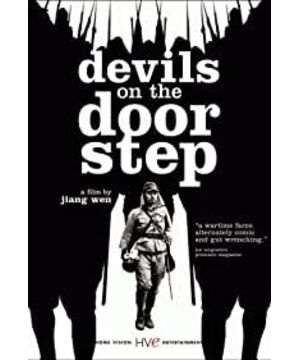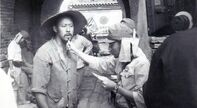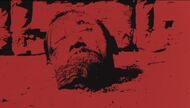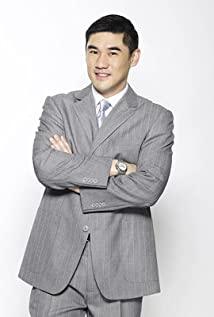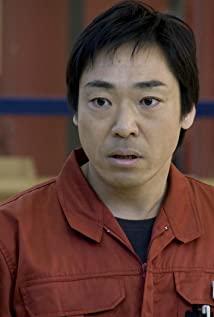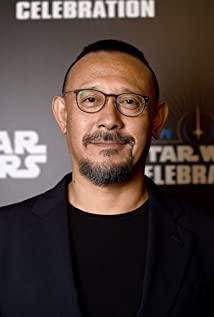Every time I watch "The Devil is Coming", I feel full of emotions. It's like being bombarded by artillery fire. My body and mind are bursting. But for a long time, I don't know what kind of words to use to vent these turbulent and complex energies in my heart, so the aftermath of this movie has been delayed.
Jiang Wen directed "Devils Are Coming" five years after directing "Sunny Days". It can be said that Jiang Wen was full of energy to make this film. The movie was doomed to die in domestic theaters at the beginning of its conception. After the filming was completed, it was banned nationwide due to the damage to the image of the Chinese people. Now we can see that in the list of awards for this film, the name of Cannes is on the list. It is attributed to Jiang Wen who secretly took the film and delivered it to the film. Cannes. When the film bureau learned of this news, it interviewed three production companies and asked for withdrawal, but it was too late. "The Devil is Coming" won two awards and one nomination at the Cannes International Film Festival, which is a considerable harvest.
Every age needs truth
It is worth mentioning that although "The Devil Has Come" was banned in China, it was unexpectedly able to be released in Japan. Of course, the wretchedness, brutality and cowardice of the Japanese in the film will inevitably arouse the disgust of many Japanese. Therefore, some violent groups in Japan sent faxes to the distribution company before the release, threatening to fail to guarantee the safety of the Japanese actors in the film.
To this day, there are still many films about the Sino-Japanese war, but "The Devil Is Coming" is the most authentic one I have ever seen. In fact, not only China, but Japan also has film and television dramas during World War II. Of course, their positions are different. Such Japanese film and television dramas are also ideologically distorted. "The Devil's Coming" can stand out among many film and television dramas about the Sino-Japanese war because its angle is relatively neutral. Whether it is a Chinese or a Japanese, there is an indescribable discomfort in my heart after watching this film, because Jiang Wen tore the figurines on both sides of the crotch.
Due to the labelled description of the war by a large number of domestic art works, whenever the 15-year Sino-Japanese War is mentioned, the impression is of military-civilian cooperation, guerrilla tactics, etc. Among them are the brutality of the Japanese, and the hard-working and intelligent China. The reaction of the people. Therefore, when we ask the Japanese to apologize internationally and ask the Japanese to reflect, those diehards will arrogantly take these films and TV shows we filmed to tell others that the Chinese people were all soldiers in that war, so there was no massacre. When we were complacent about filming these "fighting devils" film and television dramas, we did not know that we gave the enemy a reason to quibble.
Every age needs truth, and this age even more so. If an era is extolling virtue and whitewashing peace, then when this era becomes history, how can future generations talk about the truth? Fortunately, during the Republic of China, there were people like Lu Xun who came forward to inspire the people at that time and warn future generations. In our era, we are fortunate to have people like Jiang Wen who made films like "The Devil Is Coming", which allowed us to see ourselves thoroughly.
We have talked a lot about the arrogance, hypocrisy, naivety, cowardice and other national characteristics in the movie, so this article will not analyze it. I am more willing to talk about movies in terms of movies, from the standpoint of China and Japan in the story, to talk about the shaping of human nature under different education systems. Bei Dao said, "The despicable is the pass of the despicable, and the noble is the epitaph of the noble." As far as this film is concerned, I think "brutality is the passport of the invaders, and patriotism is the epitaph of the profiteers".
The Japanese under the Military Thought of World War II
There are five main Japanese people in the movie, the first is Kozaburo Hanaya who was captured, the second is Nonomura who is guarding the gun tower, the third and fourth are two soldiers who grab chicken to eat, and the fifth is It is sake mound. Three of them are featured in the movie, Hanaya Kozaburo is a guy who is afraid of death, Nonomura gets along with the children on the platform, and Shuzuka is a typical image of a Japanese officer. Although these people have their own personalities, they have nothing in common. If I want to use these five people to reveal the Japanese national character, I prefer to divide the five people into pyramids and look at them vertically. Shuzuka is at the top of the pyramid, Nonomura is at the middle of the pyramid, and Hanaya Kozaburo and the two chicken-grabbing soldiers are at the bottom.
Shuzuka is the product of a typical Japanese education, unconditional loyalty to the emperor, the spirit of Bushido, and the Chinese life is like a must. When he saw Hanaya Kosaburo coming back, he was furious. He thought that Hanaya, which had already been named a hero, was captured by the Chinese people, which was a disgrace to the Japanese. However, while criticizing the arrogant character of the Japanese, one cannot but admit that the Japanese are a principled nation. Although Jiuzuka promised to send Ma Dasan food out of hypocrisy, we cannot deny that the Japanese have been able to fight for fifteen years on the land of China, and this kind of discipline in their bones has played a great role.
When Hanaya Kozaburo was first captured, he actually had the shadow of a traditional Japanese soldier like Shuzuka. However, the ants were still alive, and after Ma Dasan tossed him a few times, he gradually developed a desire for life. From the beginning of the flower house's intention to abuse the villagers, to the end of begging, it can be seen that the education of military ideology can indeed distort a person's human nature and elevate it to the spiritual height of "leading a knife to a speed", but once it really faces death— - And if you think that you are going to die twice like Hanaya, you will see the brilliance of life, completely throw away the thoughts that have been instilled, and return to the essence of human nature. Therefore, I put Hanaya at the bottom of the Japanese national pyramid precisely because his cowardice was completely exposed.
When people like Hanaya and Shuzuka were brainwashed by Japanese education and regarded Chinese lives as leeches, Nonomura still retained a trace of goodwill to treat Chinese people as human beings. Every time he passed by the hanging platform, he would give candy to the children. Of course, Nonomura acts like this because it makes him feel a certain sense of racial superiority. As for the other two Japanese soldiers who robbed chickens, they completely revealed the despicable side of the Japanese characters. Not all soldiers in Japan are as serious and cruel as Shuzuka, and some are cowardly villains. They become arrogant and arrogant because of their strong identity background, and gain their own superiority from bullying the weak. But if faced with someone stronger than him, he would be completely cowardly, nodding and bowing like a pug.
It seems that human nature is complex. No matter what region or nationality there are various characters, it is only the difference in the system and education of each country that shapes the typical character of each country. Japan's military education clearly gave Japanese soldiers an advantage in World War II. It's just that when the Japanese people saw in the movie not only the seriousness and cruelty of the Japanese soldiers during the war, but also the wretchedness and cowardice of the little Japanese people, I don't know how they felt.
The "Patriotic View" of the Chinese People during the Republic of China
Whether it was the cruel wine grave or the cowardly flower house, when they finally wanted to kill the Chinese, they never hesitated. Therefore, the Japanese have always regarded discipline as a standard, and they can have a big party with the Chinese people, but with an order from the commander, no matter what the nature of his nature, he can become a devil, and if he turns his face, he turns his face. Compared with the ruthlessness in the bones of the Japanese, the Chinese people in the movie are naive. Their understanding of human nature is just like what Ma Dasan said, "I give you people, you give me food, I'm worthy of you, but you can still forgive me? Isn't the human heart born from flesh?" Although human hearts are born from flesh, But saving others by oneself is obviously too naive. If you think you are a good person, you feel that the whole world is a good person. This kind of so-called kindness and simplicity makes people feel pitiful and cannot bear to blame.
In the film, it is not only Ma Dasan who shows kindness towards the Japanese, but everyone else does too. During the "military-civilian party", the fifth uncle and grandfather were not afraid of Jiuzhuang at all. He really thought that others were having a party with him. When Jiu was happy, he not only sang it himself, but also let Jiuzhuang sing a song. In addition, the eight aunts and Liuwang did not regard themselves as outsiders, and they were happy to get carried away and mingle with the Japanese officers.
From this, it can be considered that Hangjiatai may not have encountered war since the War of Resistance Against Japanese Aggression. Only Nonomura's team has come here, but Nonomura has never disturbed the people. Therefore, the villagers in Kaojiatai have not seen the brutality of the Japanese, and believe that the Japanese have the same simple heart as them. As a result, these ordinary people showed a "very happy to have friends from afar" during the party.
The situation of Hangjiatai was perhaps a typical example of many rural Chinese villages at that time. They have lived in remote places for a long time, and they know very little about what is happening in the outside world. They only know that there is a war, but they do not realize the ferocity of war. In Chinese history, dynasties have changed frequently. For people living in remote areas, war is actually a normal thing that has nothing to do with oneself. Especially in the early 20th century, from the overthrow of the Qing government by the revolutionary army, to the melee of warlords, and then to the War of Resistance Against Japan, wars occurred every year, but the particularity of the War of Resistance was the aggression of foreign nations.
But for the concept of national justice, the education of the rural people is weak, or as far as movies are concerned, the people who hang out on the platform hardly have a deep understanding of the words "nation" and "patriotism". This is also easy to explain. In Chinese history, there have been countless aggressions by aliens, from the "Five Husbands and Ten Kingdoms" to the "Yuan Dynasty" and the "Qing Dynasty". Because of the constant rule of aliens, many people have a weak concept of the country. And it is precisely because the Chinese people do not have such barriers of national self-limitation that they can promote the great integration of various ethnic groups with the Han nationality. Therefore, during the Anti-Japanese War, many people at the bottom had almost no concept of the country and the nation, and the years of war had made them unbearable. "Two acres of land, one cow, and wives and children on the kang head" were their only pursuits.
We saw in the movie that when the flower house proposed to "exchange food", the common people in Jiajiatai decided to change it, and were overjoyed when they heard that they would be given six carts of food. It is not their selfishness to blame, but because they have never received a patriotic education. What's more, in the late Qing Dynasty, warlords were divided and wars continued. Those powerful and powerful Chinese were killing and plundering their compatriots. How could that chaotic country make these people who are in a corner love them? Let them use what reason to love?
Patriotism is a pretext for some profiteers
As a result, patriotism became a pretext for the whole country to seek personal gain at that time. The most representative "patriot" in the movie is the eight aunts. When Ma Dasan borrowed white noodles, the eighth aunt said that eating white noodles for Japanese devils is a traitor, but when Ma Dasan said that he would borrow one bag for eight bags, she immediately agreed. Later, because Ma Dasan did not kill the Huawu and the translator, the eighth aunt scolded him for "partnering with the devils as a traitor", but when Ma Dasan later proposed to exchange the flower house and the translator for food, the eighth aunt agreed again. She kept saying, "I'd rather die than be a traitor", but during the "military-civilian party", the girls happily sang songs. From the character of the eight aunts, we can see that many Chinese people at the bottom of the Republic of China lacked patriotism, and the so-called patriotism was just an excuse for profit in their mouths. Jiang Wen said that "patriotic thieves are more terrible than traitorous thieves", which is exactly the reason.
Not only the Chinese people, but also high-level officials. We saw that when Ma Dasan slashed the enemy with his hands, the Chinese officers wanted to execute him and gave a arrogant patriotic speech. He said, "What is anti-Japanese? Those who drive the enemy out of the country with the bloody battlefield of the Japanese army are like Ma Dasan slashing to death. Unarmed, the prisoners of the day when they lose the will to resist, it is a puppet anti-Japanese evil." But he didn't know that the people at Hangjiatai were also unarmed at the time and were killed by Japanese officers. In the end, he also asked the Japanese to kill Ma Dasan, fearing that his soldiers would stain their hands. As long as the officer has a trace of patriotism and a little national conscience, he will not do this. The "patriotism" in his mouth is just an excuse, and what he said about an international treaty is just to show that his ideological level is higher than these ordinary people, and let the Americans next to him see how he has an international outlook. Compared with those warlords who openly abuse the common people, this kind of hypocrite who is full of benevolence, righteousness and morality is even more terrifying.
According to the movie "The Devil Has Come", looking back at the Sino-Japanese War during the Republic of China, if the Japanese militarism education is abominable, then it is sad that there was no patriotic education in China at that time. When there is no such patriotic education of national righteousness, the tragedy of hanging on the platform will be staged in any era, and the ignorant people will be like the singer in the movie. When the tragedy happens, it is completely a spectator mentality. , comment "This is a good story", and then hang up the matter. Taking history as a mirror, patriotic education is essential in any age.
View more about Devils on the Doorstep reviews


